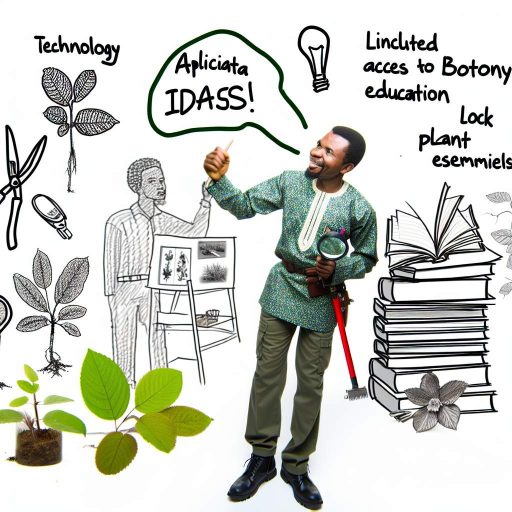Introduction:
Zoology is the scientific study of animals.
It encompasses their behavior, physiology, classification, and distribution.
This field plays a crucial role in understanding the biodiversity and ecological balance of our planet.
Understanding the differences between applied zoology and general zoology is essential.
Students and professionals in the field need to grasp these two branches.
They have distinct focuses and applications in the study of animals.
Definition of Applied Zoology:
Applied Zoology focuses on the practical applications of zoology in various industries.
It involves using knowledge of animal behavior, physiology, and ecology to solve real-world problems.
Applied zoologists work to improve human-animal interactions, conservation efforts, and agricultural practices.
They often collaborate with other professionals, such as veterinarians, farmers, and policymakers.
Examples of fields where applied zoology is used include agriculture, wildlife conservation, and pharmaceuticals.
In agriculture, applied zoologists work to develop sustainable farming practices and improve animal welfare.
Wildlife conservation efforts rely on applied zoologists to study endangered species and develop conservation strategies.
Applied zoology also plays a crucial role in pharmaceutical research, where scientists study animal behavior to develop new drugs.
Applied zoology plays a vital role in addressing global challenges related to animal welfare, biodiversity loss, and public health.
General Zoology is defined as:
It focuses on the study of animals and their biology, behavior, and habitats.
It emphasizes the overall understanding of the animal kingdom without specific real-world applications.
The Scope of General Zoology
General Zoology covers a wide range of topics related to the animal kingdom. This includes:
- Classification of animals based on their characteristics and evolutionary history.
- Comparative anatomy to study the structure and function of different animal species.
- Animal physiology to understand the biological processes in animals.
- Ecology and behavior to explore the interactions between animals and their environment.
Research in General Zoology
Researchers in General Zoology focus on expanding our knowledge of various animal species. They conduct studies:
- To discover new animal species and understand their unique traits.
- To investigate the evolutionary relationships between different groups of animals.
- To study the behavior of animals in their natural habitats.
- To analyze the impact of environmental changes on animal populations.
Career Opportunities in General Zoology
Individuals who specialize in General Zoology can pursue a variety of careers. These include:
- Zoologists who work in research institutions, museums, or wildlife conservation organizations.
- Wildlife biologists who study the behavior and habitats of wild animals.
- Animal caretakers who work in zoos, aquariums, or wildlife rehabilitation centers.
- Environmental consultants who assess the impact of human activities on animal populations.
General Zoology provides a broad understanding of the animal kingdom and its diverse inhabitants.
Discover More: Future Prospects of Nigeria’s Ship Building Industry
Key Differences in Education and Training:
– Applied zoologists often have specialized training in specific industries.
– General zoologists typically have a broader education in animal biology and ecology.
When it comes to education and training, there are significant differences between applied zoologists and general zoologists.
Let’s delve deeper into these variances.
Applied Zoologists:
- Specialized Training: Applied zoologists undergo specialized training that is focused on practical applications within specific industries.
- Hands-On Experience: They often engage in hands-on learning experiences to develop skills relevant to their area of expertise.
- Industry Collaboration: Applied zoologists frequently collaborate with industry professionals to address real-world challenges in fields such as veterinary science, conservation, and wildlife management.
- Professional Certifications: Many applied zoologists obtain professional certifications to enhance their credibility and qualifications in their chosen field.
- Problem-Solving Skills: Their training emphasizes problem-solving skills to tackle complex issues related to animal health, behavior, and management.
General Zoologists:
- Broad Education: General zoologists receive a comprehensive education that covers a wide range of topics in animal biology, ecology, and evolution.
- Research Focus: They often focus on conducting research studies to expand scientific knowledge and contribute to the understanding of animal behavior and ecosystems.
- Academic Settings: General zoologists are commonly employed in academic institutions, research organizations, and governmental agencies where they conduct research and teach students.
- Ecological Studies: They are involved in ecological studies that explore the interactions between organisms and their environments, including patterns of distribution and abundance.
- Conservation Efforts: General zoologists play a crucial role in conservation efforts by studying endangered species, habitats, and ecosystems to develop strategies for protection and management.
Both applied zoologists and general zoologists share a passion for studying and understanding animals.
Their education and training paths diverge significantly.
Applied zoologists focus on practical applications in specific industries.
General zoologists have a broader academic background and often engage in research and conservation efforts.
Both career paths offer unique opportunities to make a positive impact on the world of zoology.
You Might Also Like: Frequently Asked Questions about Applied Biology
Career Opportunities in Applied Zoology:
Applied zoology offers a wide range of career opportunities for individuals who are passionate about studying and working with animals.
Here are some of the job roles available for applied zoologists:
- Wildlife Biologist: Conduct research on animals in their natural habitats to understand their behavior and ecology.
- Zoologist: Study animals’ anatomy, genetics, behavior, and habitats to contribute to conservation efforts.
- Marine Biologist: Focus on studying marine organisms and ecosystems to protect and preserve marine life.
- Animal Behaviorist: Study and analyze animal behavior to understand their communication, social interactions, and cognition.
- Conservation Scientist: Develop and implement strategies to protect endangered species and their habitats.
There is a high demand for specialized knowledge in industries like veterinary medicine and wildlife management.
Applied zoologists play a crucial role in these sectors:
- Veterinary Medicine: Applied zoologists work in veterinary clinics, animal hospitals, and research labs to diagnose and treat animal diseases.
- Wildlife Management: They work with wildlife agencies to develop conservation plans, manage wildlife populations, and preserve habitats.
- Zoos and Aquariums: Applied zoologists contribute to animal care, breeding programs, and research initiatives in zoos and aquariums.
- Environmental Consulting: They assess the impact of human activities on wildlife and ecosystems and recommend measures to mitigate environmental damage.
- Conservation Organizations: Applied zoologists collaborate with NGOs and government agencies to promote wildlife conservation and sustainability.
Overall, the field of applied zoology provides diverse career opportunities for individuals interested in working with animals and making a positive impact on biodiversity conservation and animal welfare.
You Might Also Like: Anthropology and Nigerian Indigenous Knowledge Systems
Career Opportunities in General Zoology
When it comes to career opportunities in general zoology, there are various paths that individuals can take to pursue their passion for animals and biology.
Whether it involves research, teaching, or conservation efforts, general zoologists play a crucial role in understanding and protecting the diverse species of the animal kingdom.
Transform Your Career with Expert Guidance
Get personalized mentorship consulting that’s tailored to your unique path. Our expert advice is actionable and exclusive.
Get StartedResearch
One of the most common career paths for general zoologists is in research.
Research opportunities can range from studying animal behavior in the wild to conducting experiments in a laboratory setting.
General zoologists may work in universities, research institutions, or government agencies to further our understanding of various animal species.
Teaching
Another important career path for general zoologists is in teaching.
Educating the next generation of biologists and conservationists is essential in preserving the biodiversity of our planet.
As a teacher, general zoologists can share their knowledge and passion for animals with students at all levels, from elementary school to university.
Conservation
Conservation is a critical aspect of general zoology, as it involves protecting endangered species and their habitats.
General zoologists working in conservation may collaborate with government agencies, non-profit organizations, and wildlife reserves to develop and implement conservation strategies.
By studying the behavior and biology of animals, general zoologists can contribute valuable insights to conservation efforts.
Importance of Foundational Knowledge
Regardless of the specific career path chosen, a strong foundational knowledge of animal biology is essential for general zoologists.
Understanding the anatomy, physiology, and behavior of animals is crucial in conducting research, teaching, and conservation efforts effectively.
Without a solid understanding of animal biology, general zoologists may struggle to make meaningful contributions to the field.
General zoology offers a wide range of career opportunities for individuals passionate about animals and biology.
Whether it involves conducting research, teaching students, or working in conservation, general zoologists play a vital role in studying and protecting the diverse species that inhabit our planet.
Uncover the Details: Bioinformatics: Nigerian Contributions to Global Research

Research Focus in Applied Zoology:
Applied zoologists often conduct research to solve specific practical problems.
They focus on finding practical solutions to challenges affecting animals and their environments.
One key aspect of research in applied zoology is addressing specific issues impacting animal health, conservation, or welfare.
Examples include studying the effects of pollutants on wildlife populations.
It may also involve developing new methods for monitoring endangered species.
Another area focuses on ways to mitigate human-wildlife conflicts.
Applied zoologists often collaborate with professionals such as veterinarians, conservation biologists, and agricultural scientists.
These collaborations create multidisciplinary teams that tackle complex problems.
One example of applied zoology research is developing new medicines for wildlife diseases.
By studying the underlying causes of these diseases and testing treatments, they improve animal health in the wild.
Another focus area is improving agricultural practices.
This aims to minimize negative impacts on local ecosystems and wildlife.
Research may examine effects of pesticides on non-target species.
Applying sustainable farming methods or developing wildlife-friendly techniques can also be explored.
Research in applied zoology aims to make tangible differences in the lives of animals and their habitats.
By combining scientific research with practical applications, applied zoologists promote conservation and sustainable resource management.
In general zoology, researchers focus on broad questions about animal behavior, evolution, and ecology.
Importance of Basic Research
- Basic research uncovers fundamental knowledge about the natural world.
- It provides a foundation for applied research in various fields.
- Basic research helps us understand the complexities of animal life and ecosystems.
- It contributes to the development of theoretical frameworks in zoology.
- Basic research leads to new discoveries and advancements in scientific understanding.
- It enhances our appreciation and conservation efforts for wildlife and ecosystems.
By focusing on basic research, general zoologists play a crucial role in expanding our knowledge of the natural world and enhancing our understanding of animal behavior, evolution, and ecology.
Key Differences Between Applied Zoology and General Zoology
Applied zoology is more focused on solving real-world problems related to animals.
In contrast, general zoology is more concerned with understanding the fundamental principles of animal biology.
Applied zoology plays a crucial role in addressing environmental issues, wildlife conservation, and sustainable development.
Meanwhile, general zoology contributes to our overall understanding of the animal kingdom.
Applied zoologists often collaborate with government agencies, conservation organizations, and research institutions.
They develop strategies for protecting and managing animal populations.
On the other hand, general zoologists may work in academia, museums, or research laboratories.
- Applied zoology is more focused on solving real-world problems related to animals.
- General zoology is more concerned with understanding animal biology principles.
- Applied zoologists often work with governmental bodies and conservation groups.
Both fields are essential in advancing our knowledge across the animal kingdom.
Applied zoology has a direct impact on conservation efforts and wildlife management.
Meanwhile, general zoology provides foundational research that informs practical applications.
Integrating insights from both fields helps us protect diverse species.
This ensures a more sustainable future for all living beings.
Additional Resources
Morphometrics of human skulls and mandibles obtained from …
List of Journal Abbreviations This list is based mostly on ISO 4:1997 …




